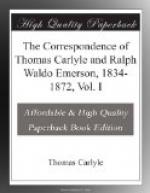On the whole I think the odds are that I shall some time or other get over to you; but that for this winter I ought not to go. My London expedition is not decided hitherto; I have begun various relations and arrangements, which it were questionable to cut short so soon. That beggarly Book, were there nothing else, hampers me every way. To fling it once for all into the fire were perhaps the best; yet I grudge to do that. To finish it, on the other hand, is denied me for the present, or even so much as to work at it. What am I to do? When my Brother arrives, we go all back to Scotland for some weeks: there, in seclusion, with such calmness as I can find or create, the plan for the winter must be settled. You shall hear from me then; let us hope something more reasonable than I can write at present. For about a month I have gone to and fro utterly idle: understand that, and I need explain no more. The wearied machine refused to be urged any farther; after long spasmodic struggling comes collapse. The burning of that wretched Manuscript has really been a sore business for me. Nevertheless that too shall clear itself, and prove a favor of the Upper Powers: tomorrow to fresh fields and pastures new! This monstrous London has taught me several things during the past year; for if its Wisdom be of the most uninstructive ever heard of by that name of wisdom, its Folly abounds with lessons,—which one ought to learn. I feel (with my burnt manuscript) as if defeated in this campaign; defeated, yet not altogether disgraced. As the great Fritz said, when the battle had gone against him, “Another time we will do better.”
As to Literature, Politics, and the whole multiplex aspect of existence here, expect me not to say one word. We are a singular people, in a singular condition. Not many nights ago, in one of those phenomenal assemblages named routs, whither we had gone to see the countenance of O’Connell and Company (the Tail was a Peacock’s tail, with blonde muslin women and heroic Parliamentary men), one of the company, a “distinguished female” (as we call them), informed my Wife “O’Connell was the master-spirit of this age.” If so, then for what we have received let us be thankful, —and enjoy it without criticism.—It often painfully seems to me as if much were coming fast to a crisis here; as if the crown-wheel had given way, and the whole horologe were rushing rapidly down, down, to its end! Wreckage is swift; rebuilding is slow and distant. Happily another than we has charge of it.
My new American Friends have come and gone. Barnard went off northward some fortnight ago, furnished with such guidance and furtherance as I could give him. Professor Longfellow went about the same time; to Sweden, then to Berlin and Germany: we saw him twice or thrice, and his ladies, with great pleasure; as one sees worthy souls from a far country, who cannot abide with you, who throw you




